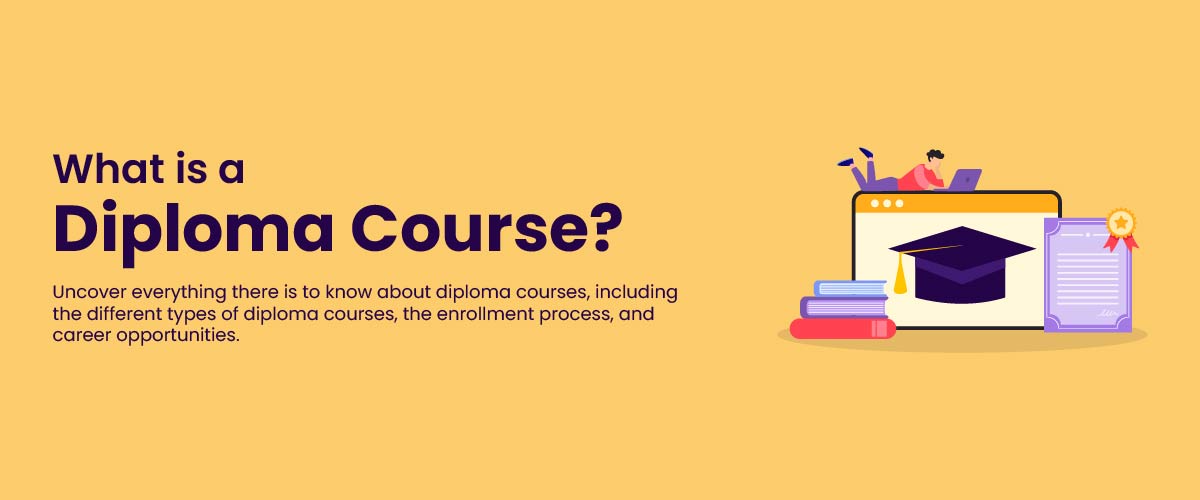What is a Diploma Course?: Types, Benefits, & Enrollment Process
Studying a diploma course makes it easier to break into the professional world and acquire a specialized skill. Diploma courses in any specialization offer the opportunity to gain practical knowledge and skills. They are usually short-term courses, with a duration ranging from six to two months. It gives students an advantage over those who have chosen a longer-term degree program. Understanding the significance of diploma courses can open doors to a world of opportunities.
In this blog, we will see what is a diploma course. We will cover its types and many more important aspects.
What is a Diploma Course?
A diploma course is like a specialized training program where you learn specific skills for a job or career. It’s shorter than a university degree and focuses more on practical knowledge for things you’ll do in a job. You can study different subjects, like business, technology, or healthcare, and get a diploma to show you’ve learned those skills. It helps you get ready for work or can be a step toward further education.
Types of Diploma Courses
Each type of diploma course aligns with specific industries, offering specialized skills and knowledge required for various career paths. Here are some types that allow individuals to choose courses aligned with their interests and professional goals:
- Technical Diplomas: These programs are designed to provide specialized technical skills in various fields such as engineering, information technology, automotive mechanics, and electronics. Students gain practical knowledge and hands-on experience relevant to their chosen industry. For example, green engineering is a new and booming industry.
- Vocational Diplomas: Focused on specific trades and practical skills, vocational diplomas cover areas like culinary arts, cosmetology, welding, plumbing, and carpentry. These courses equip individuals with the expertise needed for immediate entry into their respective professions. Before getting a diploma in this course, certificate courses related to vocational training like SolidWorks Course, 3D Printing Course, AutoCAD Course, VLSI Design Course, and PCB Design Course enable students to upskill and get a complete understanding of the subject matter and to avail SolidWorks internships,Autocad internships, etc.
- Healthcare Diplomas: In the healthcare sector, diplomas are offered for roles such as nursing assistants, medical billing, pharmacy technicians, and dental assistants. These programs offer specialized training for in-demand healthcare professions.
- Business and Management Diplomas: These diplomas cater to the business world, covering areas like marketing, accounting, human resources, and office administration. They provide foundational knowledge and practical skills required in the corporate environment. Consider taking online courses like human resource management course with a placement guarantee to start your career in human resources-related fields. With the diplomas and online courses students can even get various HR jobs and excel in their career.
- Creative Arts Diplomas: Courses in creative arts encompass fields like graphic design, photography, fashion design, and performing arts. These diplomas focus on nurturing artistic talent and providing technical skills for careers in the creative industry. Taking a graphic design or UI/UX design course, for example, along or after a diploma can help you land a job in digital marketing, creative arts, and other fields.
Benefits of Pursuing a Diploma Course
Pursuing a diploma course comes with various benefits that can shape your career and personal growth. Here are some of them:
- Specialized Skill Development – Diploma courses focus intensely on specific skills, equipping students with practical knowledge relevant to their field, and making them more job-ready upon completion.
- Industry-Relevant Training – Diploma courses are like a direct ticket to what industries want. They teach you the exact skills companies are looking for, making you a prime candidate for the job market.
- Quicker Entry into the Workforce – Diploma programs offer a faster route to entering the job market, allowing individuals to start their careers earlier than those pursuing traditional degrees, potentially reducing financial burdens.
- Cost-effective Education – Diplomas are often more cost-effective than obtaining a full degree, making them an attractive option for those seeking specialized training without the expense of a longer-term university program.
- Flexibility in Career Path – Having a diploma is like having multiple doors open. You learn skills that can fit into various job roles, giving you the freedom to choose where you want to go in your career.


How to Enroll in a Diploma Course?
Selecting the right diploma course involves several key aspects that can significantly impact your educational journey and future career. Let’s look into each of these steps to make an informed decision:
Step 1: Research Courses
Start by looking at a variety of diploma courses available either online, on college websites, or by requesting brochures from educational institutions. Consider factors such as course content, duration, specialization, and potential career paths associated with each course. Take note of the admission requirements and ensure the courses you’re interested in align with your career goals.
Step 2: Check Eligibility
Thoroughly review the admission criteria for each diploma course. Pay close attention to academic prerequisites, language proficiency requirements, and any specific qualifications or experiences needed. Ensure that your educational background and qualifications meet the stated criteria to avoid complications during the application process.
Also, explore some top short term courses after graduation to start your career.
Step 3: Application Form
Collect the application form from the institution’s website or admissions office. Carefully fill out the form, providing accurate personal information, educational history, and any additional details requested. Take your time to avoid errors and ensure all sections are complete.
Step 4: Gather Documents
Collect all necessary documents required for the application process. These typically include academic transcripts, certificates, standardized test scores, identification documents, and, in some cases, letters of recommendation or a personal statement. Verify that these documents meet the institution’s specifications and deadlines for submission.
Step 5: Application Submission
Once the application form is filled out and the documents are gathered, submit your application as per the instructions provided by the institution. This might involve an online submission through their portal or mailing the documents to the admissions office. Ensure you meet the application deadline to be considered for enrollment.
Step 6: Application Fee
Some institutions charge an application fee to process applications. Follow the provided instructions to pay the fee, and make sure it’s done within the stipulated time frame.
Step 7: Course Commencement
Once you’ve completed all enrollment formalities, start your diploma course by following the timetable, class schedule, or any other guidelines provided by the institution.
Best Diploma Courses
It is difficult to state which is the best diploma course. There is not a single best course to pursue a diploma. The best diploma course for a learner depends on two things: what specialization you are interested in and what career you want to pursue. It is important to research and compare different courses to find the one that best suits an individual’s needs. However, there are some of the most popular certificate courses to pursue after completing a diploma program to upskill, including digital marketing courses, data science courses, product management courses, and full-stack development courses.
Conclusion
In this blog, we’ve learned what is diploma course. They are like specialized skill boosters, offering practical knowledge for specific careers. They are great for quick job entry but might not carry the same weight as traditional degrees. So, are they the right choice for you? Consider your goals and do your research well. If you’re looking for a job or internship in your field of interest after your diploma, take a look at our blogs with job search tips to find the right opportunity.
Do you see a diploma as a shortcut to your dream career or a stepping stone for further education? Answer in the comments.







